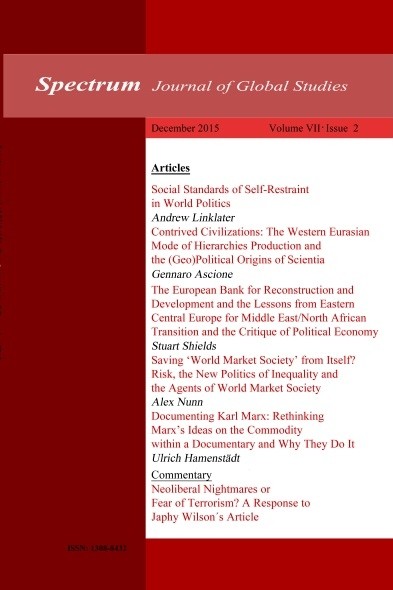Neoliberal Nightmares or Fear of Terrorism? A response to Japhy Wilson´s Article
Neoliberal Nightmares or Fear of Terrorism? A response to Japhy Wilson´s Article
Political scientists are increasingly interested in popular culture. Notably, films appear as reflections
of social and political developments as well as mirrors of common ideologies and fears. In his
article ‘Neoliberal Nightmares’, Japhy Wilson (2015) brings forward the argument that the
increasing popularity of gothic themes like the zombie apocalypse, could be interpreted as a
reaction towards the financial crises of 2008; according to his article, neoliberalism died but is risen
from its crave, scary as it was and hungry for the consumption of human flesh. This is a popular
view on the current zombie hype and it is convincing at first. In contrast to Wilson´s view, this
article highlights another interpretation of this hype: Zombies are the projection of international
terrorism. Therefore this article argues that we are much more scared by things, which take our
system into question than by the system itself. In doing so, this article argues, contrary to Wilson’s
interpretation, that the zombies hype is part of a social and political anxiety from terrorism and not
the anxiety due to the capitalist system. It will be also argued that fear is a recurrent topic in
popular culture. ‘Zombies’ are an expression in a long tradition of fearful (international) events –
like 9/11 – but also refer to the age of bio-political control.
Keywords:
Zombies, popular culture, terrorism bio-politics,
___
- Agamben, Giorgio. (2002) Homo Sacer. Die Souveränität der Macht und das nackte Leben Frankfurt: Suhrkamp.
- Blanton, Robert G. (2013) ‘Zombies and International Relations: A Simple Guide for Bringing the Undead into Your Classroom’ International Studies Perspectives 14 (1): 1–13.
- Deylami, Shirin and Jonathan Havercroft ed. (2014) The Politics of HBO’s The Wire London, New York: Routledge.
- Dellwing, Michael and Martin Harbusch ed. (2015) Vergemeinschaftung in Zeiten der ZombieApokalypse: Gesellschaftskonstruktionen am fantastischen Anderen Wiesbaden: VS Verlag.
- Drezner, Daniel W. (2011) Theories of International Politics and Zombies Princeton: Princeton University Press.
- Elsaesser, Thomas and Malte Hagener ed. (2011) Filmtheorie: Zur Einführung, 3. Edition Hamburg: Junius.
- Franke, Ulrich and Kaspar Schiltz. (2013) ‘“They Don't Really Care About Us!” On Political Worldviews in Popular Music’ International Studies Perspectives 14 (1): 39–55.
- Hardt, Michael and Antonio Negri. (2000) Empire Cambridge, London: Harvard University Press.
- Hamenstädt, Ulrich. (2014) Theorien der Politischen Ökonomie im Film Wiesbaden: VS Verlag.
- Hamenstädt, Ulrich. (2015) Politische Theorien im Film Wiesbaden: VS Verlag.
- Horkheimer, Max and Theodor W. Adorno. (1969/2006) Kulturindustrie, Aufklärung als Massenbetrug in Max Horkheimer and Theodor W. Adorno (ed.) Dialektik der Aufklärung, 10. Edition Frankfurt: Suhrkamp.
- Hill, Timothy G. (2009) Terror, Torture, and 24: Does Jack Bauer Raise Your Personal “Threat Level”? Paper from the MPSA meeting, Chicago 2-5/04/2009 available at http://www.doane.edu/sites/default/files/media/Documents/PDFs/24%20Study.pdf (accessed 09/04/2015).
- Laucht, Christoph. (2013) ‘Britannia Rules the Atom: The James Bond Phenomenon and Postwar British Nuclear Culture’ The Journal of Popular Geopolitics 46 (2): 358–377.
- Laura Horn, Olivier Rubin and Laust Schouenborg. (2015) ‘Undead Pedagogy: How a Zombie Simulation Can Contribute to Teaching International Relations’ International Studies Perspectives first view, online: 1 MAR 2015 | DOI: 10.1111/insp.12103 (09/04/2015).
- Kiersey, Nicholas J. and Iver B. Neumann ed. (2013) Battlestar Galactica and International Relations London, New York: Routledge.
- Macleod, Alex. (2014) ‘The contemporary fictional police detective as critical security analyst: Insecurity and immigration in the novels of Henning Mankell and Andrea Camilleri’ Security Dialogue 45(6): 515–529.
- Martin, Susanne. (2013) Denken im Wiederspruch: Theorie und Praxis nonkonformistischer Intellektueller Münster: Westfälisches Dampfboot.
- MEW 23 [Marx-Engels-Works, Vol. 23, Capital] (1867/1969) Das Kapital, Kritik der politischen Ökonomie Berlin: Dietz Verlag.
- Modeste, Jacquelynne. (2012) ‘Train Whistle Diplomacy: Blues-based Jazz and National Identity‘ Spectrum Journal of Global Studies 4 (1): 47-67.
- Müller, Wolfgang and Christel Neusüß. (1970) ‘Die Sozialstaatsillusion und der Widerspruch von Lohnarbeit und Kapital’ Sozialistische Politik 2(6/7): 4-67.
- Neumann, Iver B. and Daniel H. Nexon. (2006) Harry Potter and International Relations Lanham: Rowman & Littlefield Publishers.
- Price, Thomas J. (2004) The Changing Image of the Soviets in the Bond Saga: From Bond-Villains to „Acceptable Role Partners”’ Journal of Popular Culture 26 (1): 17-34.
- Rosa, Hartmut. (2005) Beschleunigung: Die Veränderung der Zeitstrukturen in der Moderne. Frankfurt: Suhrkamp.
- Shapiro, Michael J. (2009) Cinematic geopolitics London, New York: Routledge.
- Shapiro, Michael J. (1999) Cinematic political thought: Narrating race, nation and gender Edinburgh: Edinburgh University Press.
- Shepherd, Laura J. (2013) Gender, Violence and Popular Culture: Telling Stories London, New York: Routledge.
- Strange, Susan. (1988) States and Markets London. New York: Pinter Publisher.
- Strohmeier, Gerd. (2005) Politik bei Benjamin Blümchen und Bibi Blocksberg. In Sozialisation von Kindern in Katharina Belwe (ed) Aus Politik und Zeitgeschichte 41/2005: 7-15.
- Swimelar, Safia. (2013) ‘Visualizing International Relations: Assessing Student Learning Through Film’ International Studies Perspectives 14(1): 14–38.
- Weber, Cynthia. (2009) International relations theory. A critical introduction, 3. Edition London: Routledge.
- Weber, Cynthia. (2006) Imagining America at war. Morality, politics and film London New York: Routledge.
- Wheeler, Mark. (2014) ‘A City upon a Hill, The Wire and Its Distillation of the United States Polity’, Politics 34 (3): 237–247.
- Wilson, Japhy. (2015) ‘Neoliberal Nightmares’ Spectrum Journal of Global Studies 7(1): 78-90.
- ISSN: 1308-8432
- Başlangıç: 2009
- Yayıncı: Dış Politika ve Uluslararası İlişkiler Derneği
